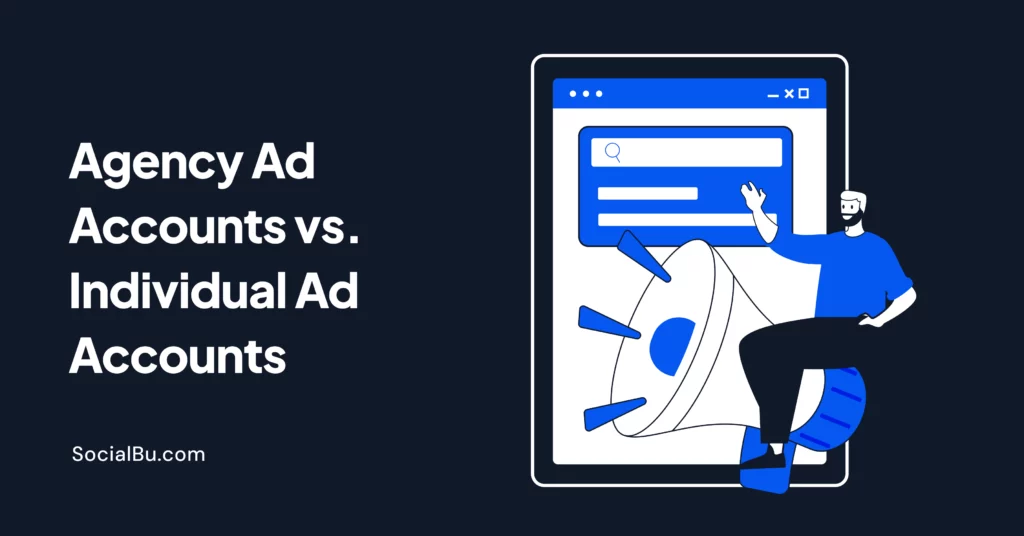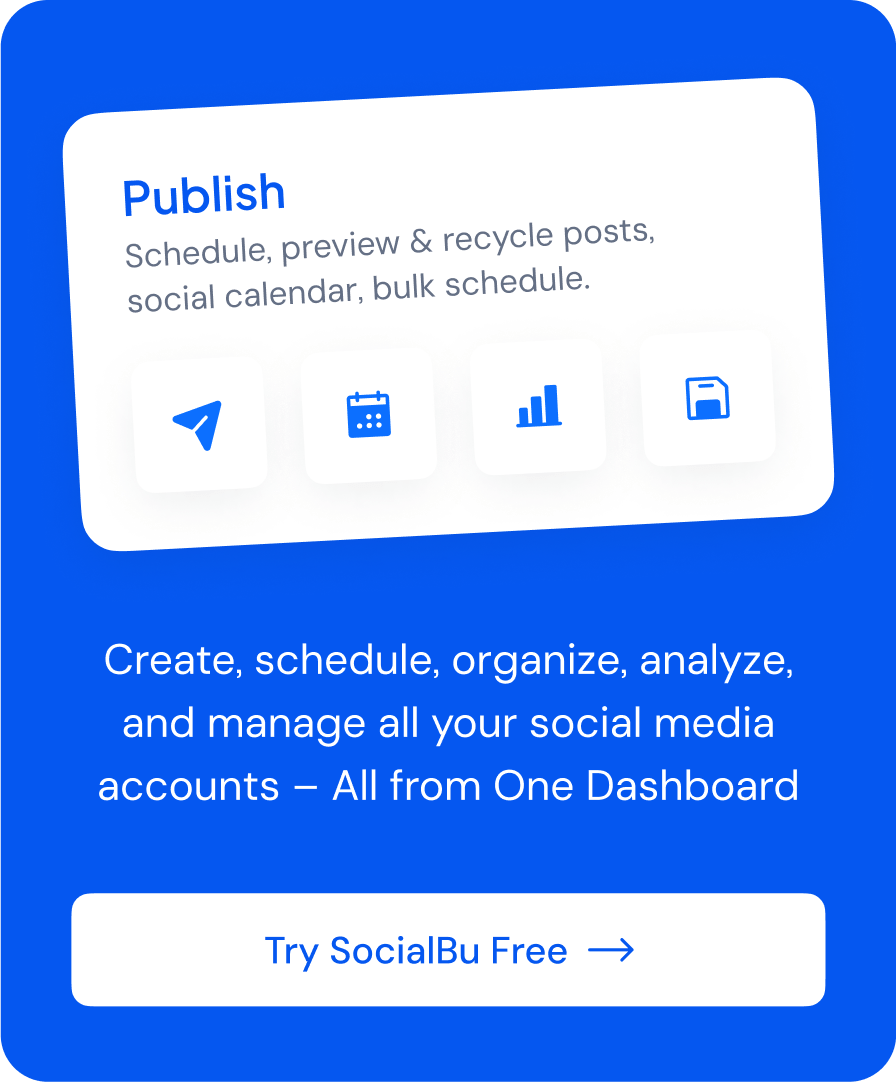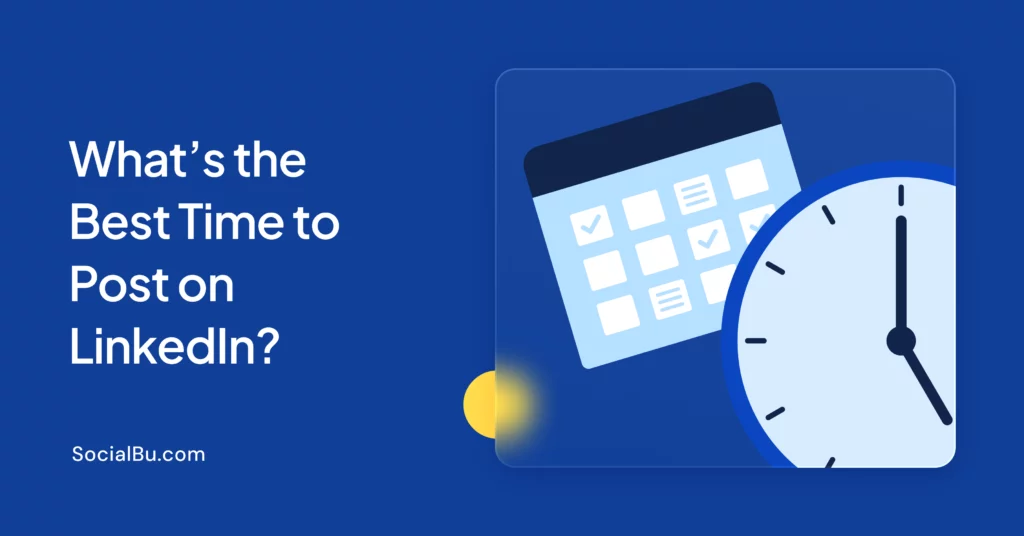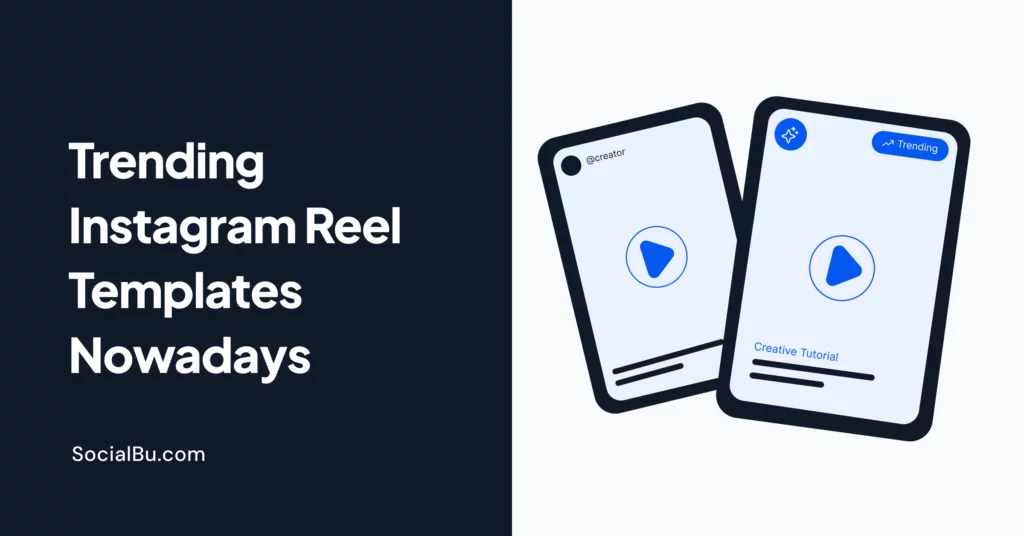Picking the right ad account for your business is like choosing between driving your car or hiring a professional driver. Do you want complete control over your campaigns, or would you rather have experts handle everything while you focus on growing your business? This is where the big decision comes: Agency vs. Individual Ad Account.
Both have pros and cons; the right choice depends on your budget, experience, and goals. In this blog, we’ll break it down in simple, easy-to-understand terms so you can decide which option works best for you. Let’s find out together.
What Is an Individual Ad Account?
An individual ad account is a self-managed advertising account that businesses create and control independently on advertising platforms. Unlike agency ad accounts, which marketing agencies manage, the company owns an individual ad account, allowing complete control over advertising activities.
With an individual ad account, businesses can:
- Create and manage their ad campaigns
- Control their ad budget and spending limits
- Optimize targeting, creatives, and performance tracking
This option is ideal for businesses that want full transparency, flexibility, and direct control over their ad campaigns without relying on a third-party agency.
Platforms Supporting Individual Ad Accounts
Most major advertising platforms allow businesses to create and manage individual ad accounts, including:
- Facebook Ads Manager – Businesses can create Facebook and Instagram ads, customize targeting, and track performance.
- Google Ads – Allows businesses to run ads on Google Search, YouTube, and Google Display Network.
- TikTok Ads – Enables brands to create engaging short-video ads to reach TikTok’s massive audience.
- Microsoft Advertising (Bing Ads) – Provides advertising opportunities on Bing Search, Microsoft Edge, and Yahoo.
These platforms provide a user-friendly interface allowing businesses to set up, launch, and optimize ads without agency support.
How Do Individual Ad Accounts Work?
Setting up and managing an individual ad account is straightforward. Here’s how it works:
Businesses Create Their Own Accounts
The business owner or marketing team registers on an ad platform like Google Ads or Facebook Ads Manager. They set up a business profile, enter payment details, and verify their identity.
Full Control Over Ad Targeting, Budget, and Creative Assets
Businesses define their ad strategy, including:
- Audience targeting – Demographics, interests, location, and behavior-based targeting.
- Ad creatives – Uploading images, videos, and ad copy.
- Budget and bidding strategy – Setting a daily or lifetime budget and choosing between manual or automated bidding.
- No agency interference—the business controls everything.
Direct Access to Performance Metrics
Businesses get real-time insights into ad performance, including:
- Click-through rate (CTR)
- Conversion tracking
- Cost-per-click (CPC) and return on ad spend (ROAS)
Unlike agency accounts, businesses do not have to wait for third-party reports—they can access data instantly.
Key Features of Individual Ad Accounts
Here are the key features you must not miss:
- Full Ownership and Control Over the Account
- No Third-Party Agency Involvement
- Flexible Budgeting and Campaign Adjustments
- Transparent Access to Campaign Performance Metrics
What Is an Agency Ad Account?
An agency ad account is a specialized advertising account owned and managed by a marketing agency that runs ad campaigns for multiple businesses or clients. These accounts are set up under the agency’s name and are not directly owned by the companies using them.
Instead, businesses are granted access to the account to monitor performance and collaborate on ad strategies. Many digital advertising platforms offer agency-focused ad account structures to help agencies manage multiple clients efficiently.
Common Platforms That Support Agency Ad Accounts
Some of the most commonly used platforms that support agency ad accounts include:
- Facebook Business Manager – Allows agencies to manage multiple client ad accounts, assign roles, and access Meta’s premium support services.
- Google Ads Manager Accounts – A Google Ads feature that lets agencies handle multiple Google Ads accounts from a single dashboard.
- LinkedIn Marketing Partner Program – Provides agencies with advanced campaign management tools, insights, and higher account limits for LinkedIn ads.
- TikTok Agency Accounts – Special ad accounts for agencies with higher spending limits, priority support, and exclusive ad formats.
How Do Agency Ad Accounts Work?
Agency ad accounts function as centralized hubs where agencies create and manage advertising campaigns for multiple clients at once. Here’s how they work:
Agencies Set Up a Master Account
Agencies create a master ad account under their business profile on advertising platforms like Facebook, Google, or TikTok. This master account contains multiple client accounts.
Clients Are Given Limited Access
Businesses do not own these accounts outright; the agency assigns restricted access to their clients. Clients can monitor campaign performance, request changes, and sometimes modify settings, but they don’t have complete control over the account.
Agencies Handle the Entire Ad Management Process
The agency designs, launches, and optimizes ad campaigns for clients. It improves campaign performance through data-driven strategies, AI-powered tools, and market insights.
Use of Third-Party Ad Management Tools
Many agencies rely on automation tools like Skai, Adzooma, and Smartly.io to efficiently manage multiple client campaigns. These tools help with budget allocation, A/B testing, performance tracking, and ad scaling.
Billing & Payments Managed by the Agency
Some agencies offer credit lines or bulk discounts for running ads, which individual businesses may not qualify for. Agencies either charge clients a fixed monthly fee or take a percentage of the ad spend as their service fee.
Key Features of Agency Ad Accounts
Agency ad accounts have several exclusive benefits, differentiating them from regular individual ad accounts.
Managed by an Agency with Advertising Expertise
Businesses benefit from the agency’s experience, industry insights, and specialized knowledge in digital advertising. Agencies have dedicated teams for strategy, ad creatives, targeting, and campaign optimization.
Higher Spending Limits Compared to Individual Accounts
Many platforms impose spending limits on new ad accounts to prevent fraud. Agency ad accounts usually have higher spending limits and can scale ad budgets faster than individual accounts.
Direct Access to Platform Support Teams
Advertising platforms often provide priority support to agencies, allowing them to resolve issues faster. This includes direct access to Google, Facebook, LinkedIn, or TikTok support representatives, which individual businesses may not have.
Agencies May Provide Bulk Discounts and Credit Lines
Some agencies prepay for ad credits in bulk, allowing them to negotiate discounted ad rates with platforms. Businesses using agency ad accounts may get better pricing or credit-based advertising options that individual accounts don’t offer.
Professional Reporting and Advanced Analytics
Agencies use AI-powered tools to analyze campaign performance, helping businesses optimize their marketing strategies. Detailed reports include ROI tracking, conversion metrics, A/B test results, and audience insights.
Shortcomings of Agency vs. Individual Ad Account
To help you decide between agency vs. individual Ad account, we will now examine the drawbacks of both.
Drawbacks of Individual Ad Accounts
Managing an individual ad account can be an excellent option for businesses that want complete control over their advertising strategy. However, it also comes with challenges requiring time, expertise, and effort.
Time-Consuming
Running an ad account requires knowledge of digital marketing, audience targeting, ad bidding, and analytics. Businesses must constantly monitor, test, and optimize their campaigns to achieve the best results.
Lower Spending Limits
Many advertising platforms restrict the spending of new accounts, limiting their daily or monthly amounts. Individual advertisers often start with lower credit limits and ad budgets, which can restrict large-scale advertising campaigns.
Basic Customer Support
Individual ad accounts do not have direct access to dedicated support teams like agency accounts do.
If issues arise (such as disapproved ads, billing problems, or policy violations), businesses must rely on help centers, email support, or automated chatbots, which may not provide quick resolutions.
Greater Risk of Account Suspension
Advertising platforms have strict policies regarding ad content, targeting, and compliance. If a business accidentally violates policies, its ad account may get suspended or permanently banned.
Individual accounts often lack appeal options—once banned, it can be challenging to recover access.
Drawbacks of Agency Ad Accounts
While agency ad accounts offer many advantages, they also have some potential downsides that businesses should consider before choosing this approach.
Limited Control
One of the most significant downsides of agency ad accounts is that businesses do not own them. The agency has full control over ad settings, spending, and account access, so clients must rely on the agency to make adjustments.
Long-Term Contracts
Many agencies require long-term agreements, monthly retainers, or revenue-sharing models. These contracts can be expensive, especially for small and medium-sized businesses that may not have a large advertising budget.
Risk of Data Loss
Since the business does not own agency ad accounts, all campaign data, audience insights, and ad performance metrics are stored under the agency’s control. If an agency shuts down, loses platform access, or decides to stop working with a client, businesses may lose valuable historical data.
Lack of Transparency
Some agencies do not fully disclose ad spend breakdowns, making it difficult for businesses to know exactly how their money is used.
Key Differences Between Agency and Individual Ad Accounts
Let’s look at a table where we have compared these Ad Accounts and see which fits you.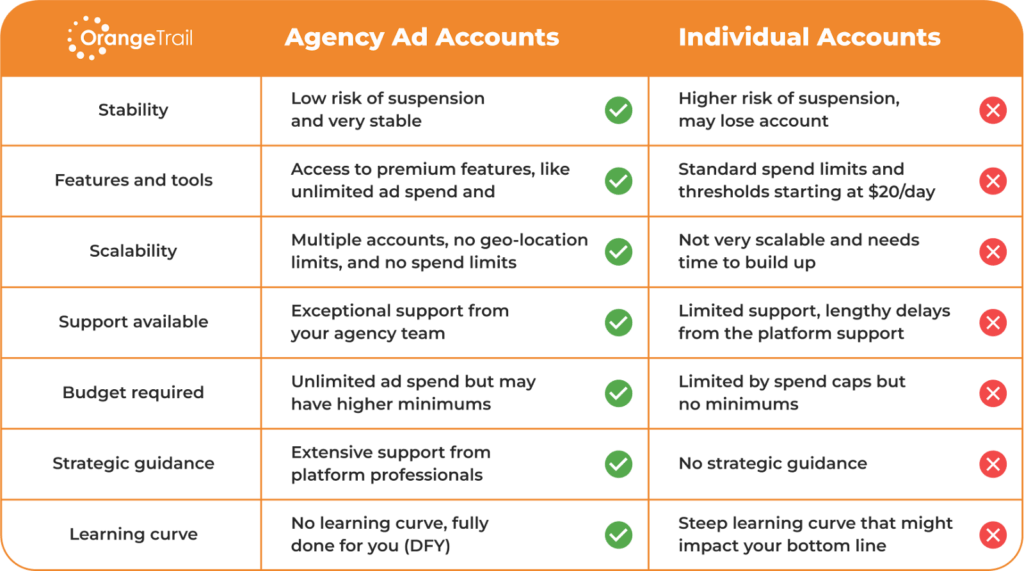
Which Is Right for Your Business?
So, after all that, which type of account is right for you?
The truth is that choosing between an individual and an agency ad account depends on several factors. When deciding between an agency ad account and an individual ad account, consider these essential aspects:
- Budget: An individual ad account gives you complete control if you prefer to manage costs directly and avoid agency fees. However, an agency ad account can provide added value if you’re willing to invest in professional management for better results.
- Expertise: Running successful ads requires knowledge and time. If you lack in-house expertise, an agency account offers expert management. If you have the skills and resources, an individual account lets you tailor strategies as you see fit.
- Growth Potential: If you plan to scale advertising quickly, an agency ad account offers higher spending limits, faster campaign approvals, and access to premium support. Individual accounts often start with lower spending caps, which can slow expansion.
- Control & Data Ownership: With an individual ad account, you own all data and campaign history. With an agency account, the agency manages access, meaning you could lose historical data if you switch agencies.
Final Thoughts
No one-size-fits-all answer exists when choosing between an agency vs. individual Ad account. An agency account is an excellent option for those who want expert support, higher ad spend limits, and advanced insights.
However, an individual account provides complete control, flexibility, and direct management of your campaigns.
No matter which route you take, managing your ads effectively is crucial. And if you want to simplify your social media scheduling and automation, SocialBu is the perfect tool to keep your campaigns running smoothly. Try it today and take your social media game to the next level!
